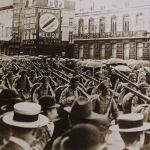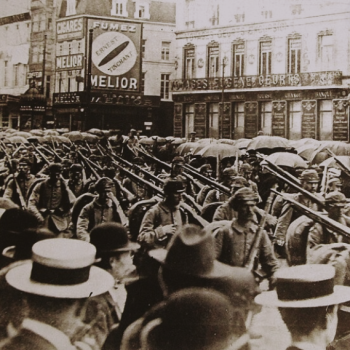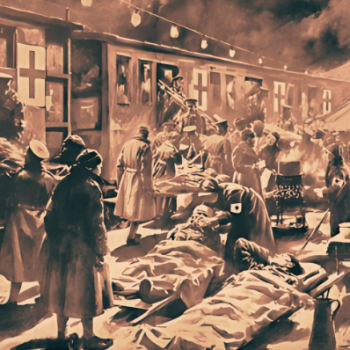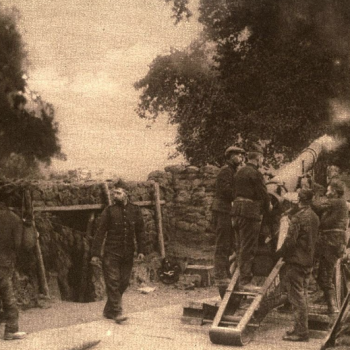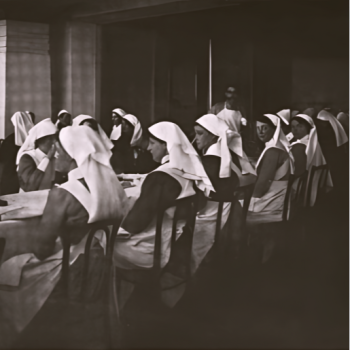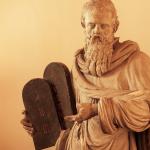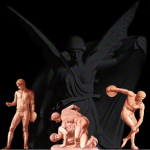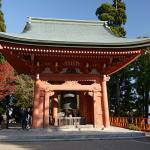As they were held on the sacred soil of Elis, the Olympic games had always been accompanied by solemn offerings to the gods, along with processions, sacrifices, and prophecy. In the year 393 C.E., the Roman Emperor Theodosius, inspired by religious zeal, declared the Olympian games forever abolished. Theodosius, it was said, was unable to disconnect “athletics from heathenism.” Many centuries later, the Olympian games were celebrated once more on Greek soil, under the auspices of a Christian prince, and “zealously abetted by a Christian people.” The groundwork for the Olympic revival began with Greece’s King George, who financed the excavations on the ancient Stadium in 1873. Laborers, hired by the King with his private finances, dug away nearly a thousand years’ worth of sediment and revealed the floor of the spacious amphitheater.
The stadium was excavated, but there was still the matter of raising funds for the project of an Olympic revival (estimated originally at 300,000 francs.) Many believed it would be impossible, owing to the financial distress prevalent in Greece. But in this “the poor put the rich to shame.” The working class of Athens was the first to vote for contributions and open public subscription lists. Then came the Greeks at home and abroad, both rich and poor, who eagerly contributed, and the necessary sum was covered.

Eben Alexander. (Soure: Wiki)
The very first subscription that reached the committee’s hands, however, was not from a born Greek, but rather from Eben Alexander, the United States Minister to Greece, who was “looked upon and claimed in Athens as a true Hellene, both by his wide acquaintance with the Greek language and literature and his whole-hearted sympathy with the country and its people.” A graduate of Yale, Alexander was an athletic enthusiast, with bicycling being his favorite form of sport. He frequently took runs to Phalerum or to the field of Marathon and back. As a patriotic American, he wished to use all his influence to see that his country was well-represented during the event.
Another American who did much to promote the Olympic revival was “a cultivated and delightful man” named George Horton, the American Consul in Athens. “Certainly, the average American needs to live a long time in Greece or the Orient before he becomes willing to adapt himself to the requirements of the climate,” he would state.[1] Horton was well adapted, and it was said that he was “probably the most enthusiastic Grecian in Chicago, if not in all America.” Born in 1859, he graduated from the University of Michigan in 1878 with a special diploma in Greek and Latin. Since his college days, the Greek language was Horton’s favorite study, and he was proud of his proficiency in both the ancient and the modern forms of the language. For several years he did work of all kinds, from editorial writing to police reporting in The Chicago Herald. In 1893 he was appointed United States Consul at Athens by President Grover Cleveland.[2] As the games approached, he would write the article, “Revival Of Olympian Games” for the March 1896 issue of The North American Review.

(Left.) George Horton.[3]
During the Athletic Congress held in Paris in the summer of 1894, it was agreed that these international sporting contests would be held every four years, “open to those only who cultivate manly sport out of love of the thing itself, and not for sordid gain.” The purpose, it was stated, was to evoke noble emulation, and to cultivate closer intimacy between the athletes of all nations. On April 6, 1896, in celebration of the seventy-fifth anniversary of the proclamation of Greek independence from the Ottomans, the first celebration of the games under the new order began with a program that would “consume at least ten days.”[4] It was said in Harper’s Weekly:
These international meetings will doubtless be welcomed by Englishmen and Americans, not merely as affording them opportunities of proving their own superiority, but as promising to be a powerful agent in promoting the cause universal of athletics, so dear to the Anglo-Saxon heart […] The mystic influence of the Greek land, with its natural beauty and its powerful historic past, will of itself alone suffice to impart to the international meeting a special brilliancy, such as the modern Greeks themselves could hardly hope to effect with the limited resources which long ages of political subjection and the onslaught of successive barbarian invaders have left them.[5]
Such “mystical influence of the Greek land” would be something of a theme with both Eben Alexander and George Horton. A few months after the Olympic games, in October 1896, Horton, who was an honorary member of the Chicago Branch of the Theosophical Society, would help establish The Theosophical Society In Greece.[6] Of the 106 founding members, one was the English-educated Athenian with a long-standing interest in Theosophy,” the poet Constantine P. Cavafy, who was elected the group’s President.[7] (Cavafy would write “Julian At Eleusis” a month later November 1896.)[8] Another member was the American Vice-Consul, G. Nicolaides, one of the most prominent citizens of Athens, and supervisor of the excavations at the site of the Olympic Stadium in Athens.[9] (Nicolaides was particularly interested in the sanctuary of Olympian Zeus, as he wanted to preserve a “decent and didactic representation of the relics of the most magnificent monuments in Greece,” for a better understanding of the history of this mysterious sacred history from the whole of Greece.)[10]
After his tenure in Greece, Eben Alexander returned to America, where he introduced the curriculum of modern Greek to the University of North Carolina (UNC.) He would also help establish a Secret Society at that university known as “The Order Of The Golden Fleece.” In 1904 UNC was caught up in a conflict between “fraternitymen and non fraternitymen, athletes and literary society men, journalists and scholars.” As the conflict threatened to destroy “everything that makes for the best interest of the campus,” Alexander met with representative students to devise a plan that “would develop a spirit of cooperation among conflicting groups.” As Alexander had been a member of Yale’s famous Skull and Bones, he proposed that UNC establish a based on that secret society. Ten men (leaders in each of the conflicting groups,) were picked for membership in the Order Of The Golden Fleece. The purpose in choosing them was that they were to meet as brother members and put aside their petty difficulties, so they might “work earnestly for those things which would foster a better spirit among the student body as a whole.” This task was accomplished “with startling rapidity.”[11]
SOURCES:
[1] Horton, George. Modern Athens. Charles Scribner’s Sons. New York, New York (1901): 8.
[2] (The Rambler.) “The Rambler.” The Book Buyer. Bol. XXIII, No. 2. (September 1901): 79-88.
[3] Ibid.
[4] Horton, George. “Revival of Olympian Games.” The North American Review. Vol. CLXII, No. 472 (March 1896): 266-273.
[5] Kalopothakes, Demetrius. “The New Olympic Games.” Harper’s Weekly. Vol. XXXIX, No. 2023 (September 28, 1895): 919-924.
[6] [“Very shortly after our arrival we met Mr. Harten [sic,] the American Consul to Athens.” Wright, Leoline. “Ancient Athens.” The Theosophical News. Vol. I, No. 19 (October 26, 1896): 1-2]; [“The American Consul was called upon and the object of the Crusade was told to him. Strange to say the Consul some years ago had been made an honorary member of the Chicago Branch and was quite familiar with the tenets of Theosophy.” “Crusade News.” The Theosophical Forum. Vol. II, No. 7 (November 1896): 110-112]; [“Strange to say the Consul some years ago had been made an honorary member of the Chicago Branch and was quite familiar with the tenets of Theosophy.” Hargrove, Ernest Temple. “The Screen of Time.” Theosophy. Vol. XI, No. 8 (November 1896): 225-232]; [“Thanks to the American Consul, we got a hall and had a meeting attended by a packed audience…” [“The March of Theosophy.” The Daily Telegraph. (Sydney, Australia) January 8, 1897.]
[7] [“On the next evening was formed the Theosophical Society in Greece with 106 members, Mr. Cavarfy [sic] being elected President.” “Crusade News.” The Theosophical Forum. Vol. II, No. 7 (November 1896): 110-112]; [“Mr. Wright had all the typewritten reports of his Chickering Hall lectures’ with him, and these were left with Mr. Kavophis [sic] At each public meeting one of these is to be given, having been already put into Greek by Mr. Kavophis. This very active President and Secretary will also translate chapter by chapter the ‘Ocean of Theosophy’ for use at the Branch meetings… Mr. Kavophis is a remarkable instance. He was probably the only man in all Greece who could have filled-this place. I suppose he little knew, when, some years ago, in Constantinople, he first became interested in the subject, and afterward read some of the books, that he was being prepared for a great work in the future…He is undoubtedly very popular in Athens, and his election to the presidency was carried with the greatest confidence and enthusiasm.” Wright, Leoline. “A Glimpse of Egypt.” The Theosophical News. Vol. I, No. 21 (November 9, 1896): 1-2.]
[8] Cavafy, C.P. Collected Poems (2nd Edition.) Edmund Keeley & Philip Sherrard (translators.) George Savidis (editor.) Princeton University Press. Princeton, New Jersey. (1992): 267; Jeffreys, Peter. Reframing Decadence: C. P. Cavafy’s Imaginary Portraits. Cornell University Press. Ithaca, New York (2015): 87.
[9] [“[We met the] American Vice-Consul, Mr. Nikolaides […] one of the most prominent citizens of Athens and a thorough enthusiast over Theosophy. He has been simply invaluable to us in a thousand ways and is the very embodiment of the delightful courtesy and friendliness and the untiring energy which arc the very satisfactory characteristics of the modern Greek.” Wright, Leoline. “Ancient Athens.” The Theosophical News. Vol. I, No. 19 (October 26, 1896): 1-2]; [“We were accompanied by Mr. Nikolaides. He is acquainted with the gentleman who is superintendent of the excavations there, and as he lives at Eleusis, Mr. Nikolaides asked to see him, and found him very willing to take us over the ruins and explain them.” Wright, Leonine. “At Eleusis.” Theosophical News. Vol. I, No. 20 (November 2, 1896): 1-2.]
[10] Νικολαΐδης, Γ. “Ανασκαφαι κατά τον έξω Κεραμεικός Ανασκαφαι εν τω περιβόλο του Ολυμπιείου.” Πρακτικά (1897): 14-15; Νικολαΐδης, Γ. “Ανασκαφή Ολυμπιέου.” Πρακτικά (1898): 62-64.
[11] “The Senior Order Of Golden Fleece Will Tap On Friday Night.” The Daily Tar Heel. (Chapel Hill, North Carolina) May 15, 1923.


